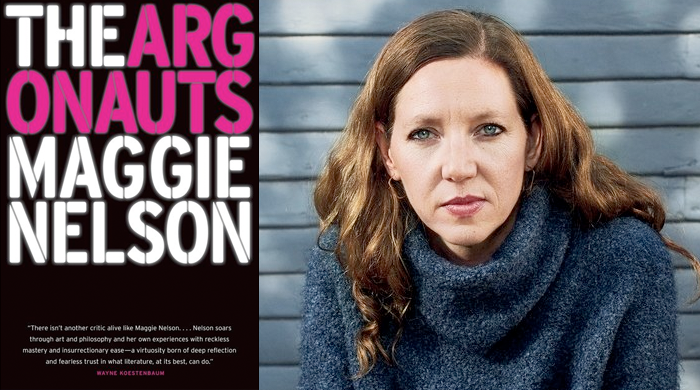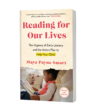Layered with academic and poetic insights, Maggie Nelson’s memoir “The Argonauts” is a meditation on love, maternity, family, sexuality, and gender. It’s distinguished by a brutally tender chronicling of the physical and hormonal transitions of the author and her partner Harry Dodge, as Nelson undergoes artificial insemination and Dodge navigates a double mastectomy and testosterone injections.
From the first paragraph Nelson establishes that this is not a book for the faint of heart or intellect. In it, she describes the acts that prompt I love you to tumble out of her mouth with her “face smashed against the cement floor of [Harry’s] dank and charming bachelor pad.” It comes as no surprise later in the book when artificial insemination, childbirth, and testosterone injections get similarly graphic treatments.
But this isn’t done to shock, or anyway not merely to shock. With scenes like these, Nelson is grounding the cerebral and emotional trappings of love in the physical ones. She’s arguing that notions of romantic love embrace pleasure seeking in all its perversity and caretaking in all its messiness, too.
The entire book conveys the sense that Nelson is working out a puzzle, trying to express the capaciousness of love in words–blunt tools that are sharpened only when they strike the raw, the guttural, the vulnerable. Sometimes she strikes with a passage from a poet or theorist, set in italics and named in the margin instead of footnotes. Other times, with moving words of her own.
Describing her and Harry’s wedding on the eve of Proposition 8’s halting of “same sex” marriages, she contrasts the public ritual of marriage with the private one of family, which knows no laws. “We let [the vows] stay standard, albeit stripped of pronouns,” she wrote. “The ceremony was rushed, but as we said our vows, we were undone. We wept, besotted with our luck, then gratefully accepted two heart-shaped lollipops with The Hollywood Chapel embossed on their wrappers, rushed to pick up the little guy at daycare before closing, came home and ate chocolate pudding all together in sleeping bags on the porch, looking out over our mountain.”
She builds a world with passages like these that are queer and not, normal and not. She explores the simultaneous insufficiency and pragmatism of labels. Boi. Cis-gendered. Andro-fag. Husband. Mother. The way the meanings change depending on who’s talking. The constant tension between individual experience and categorical ones. The blurred lines of human experience.
In Nelson’s world, a family photo on a mug can prompt a flood of questions.
But what about it is the essence of heteronormativity? That my mother made a mug on a boojie service like Snapfish? That we’re clearly participating, or acquiescing into participating, in a long tradition of families being photographed at holiday time in their holiday best? That my mother made me the mug, in part to indicate that she recognizes and accepts my tribe as family? What about my pregnancy–is that inherently heteronormative? Or is the presumed opposition of queerness and procreation (or, to put a finer edge on it, maternity) more a reactionary embrace of how things have shaken down for queers than the mark of some ontological truth? As more queers have kids, will the presumed opposition simply wither away? Will you miss it?
Is there something inherently queer about pregnancy itself, insofar as it profoundly alters one’s “normal” state, and occasions a radical intimacy with–and radical alienation from–one’s body? How can an experience so profoundly strange and wild and transformative also symbolize or enact the ultimate conformity? Or is this just another disqualification of anything tied too closely to the female animal from the privileged term (in this case, nonconformity, or radicality)? What about the fact that Harry is neither male nor female? I’m special–a two for one, his character Valentine explains in By Hook or By Crook.
This train of writing does not make for easy reading, but it does make for deep reading. The kind where you’re forced to pause, think, rethink, reread, reconsider.
Occasionally, Nelson slips into the jargon of “sodomitical maternity,” “ontological indeterminacy,” and “homonormativity” in ways that distract rather than illuminate. They feel like the poor digestion of old academic papers and presentations within this fresh container of a memoir.
Still, Nelson’s account of two individuals risking connection and forging family against a backdrop of mainstream ignorance and shame is provocative and timely. It offers a compelling contrast to the tidier, mainstream born-in-the-wrong-body trans narrative. The perspective that’s gaining steam with shows like “I Am Jazz” and “I Am Caitlyn,” which seek to “normalize” the transgender experience.
Nelson just doesn’t do “normal.” Nuanced, poetic and irresolute is more her style–and her truth.
If this post resonates with you, I bet you’ll enjoy my newsletter. I regularly send bookish news and notes out to more than 1,000 readers. Sign up here.


